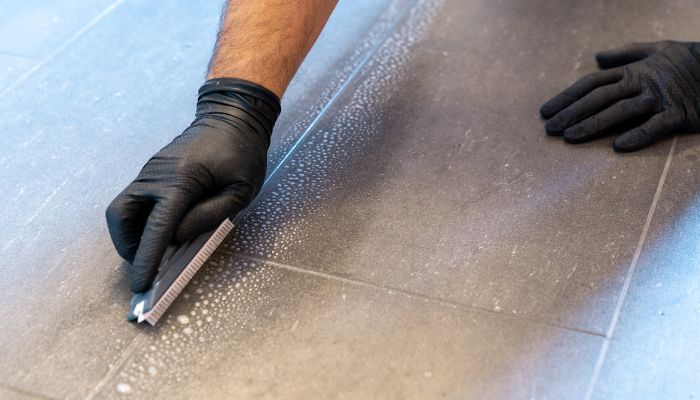Everything You Need to Know About Cleaning Your Tile Floor

Floor tiles can make or break a guest’s impression of your home. Your house can be squeaky clean, but if the floor tiles look spotty, it can label you as a messy person. Worst case scenario – dirt from the tiles gets your guest’s white socks dirty after staying at your place. However, despite bad impressions, they will lose their original quality and shine if you do not maintain your tile floors.
We provide you with a detailed cleaning floor tile guide to avoid such case scenarios. Just by following the steps, your floor tiles will be forever grateful and shiny.
How Often Should You Clean a Tile Floor?
Dirt on floor tiles is easy to spot, no matter the material they’re made of. Once you notice the tiles get a film of grease or dust, it’s cleaning tile floor o’clock!
It’s advisable to clean the tiles once you spot the dirt and not let it pile up. This will open up a lot more work for you down the road. Kitchen floors are exposed to grease, which may even damage the tiles. It’s best if you set and follow a regular cleaning routine.
The suggested frequency of cleaning the floor tiles is 2 times a week to keep them looking shiny. Reaching that pristine tile finish requires knowledge of the tile type, using specific cleaners, and an appropriate cleaning routine.
Cleaning Tile Floors: A Guide to Cleaning Different Types of Tiles
You can consult numerous cleaning articles or forums and still wonder how to clean a tile floor. To help you get started, we prepared a few guidelines for you to follow.
Floor tiles are made of various materials and can be low or high-maintenance. Usually, ceramic and porcelain are the most popular materials for tiles, and most homes opt for them. They are not difficult to maintain, yet they look amazing and pristine.
We can also find marble, stone, vinyl, or terra cotta tiles. These delicate materials require a lot of attention and cleaning with special tools and cleaners. Let’s see some of the popular tile-type specifications and maintenance tips.
Ceramic Tiles
Ceramic tiles are the most popular floor tile option because they’re durable and easy to maintain. However, easy doesn’t mean effortless or that the tiles do not absorb dirt. Here are a few tips for the best way to clean ceramic tile floors.
- Sweep the floor: Before mopping the floor, sweep the dirt off the tiles. You can use a vacuum cleaner to dust the floor effectively and clean the tiles.
- Mop the floor: Once the tiles are dusted, it’s time to mop the floor. Use a rag mop instead of a sponge because the sponge pushes the dirt into the grout.
- Use cleaning solutions: Instead of using chemical detergents, white vinegar or lemon juice in hot water will clean it effectively. However, make sure to change the water more frequently to avoid cleaning the tiles with dirty water. This way, you avoid leaving dirt residue on the tiles meaning they are not clean.
- Wipe with cloth: This is probably the most important step many omit. However, the tiles will get spotty from the water without wiping the floor with a clean and dry cloth.
Porcelain Tiles
Porcelain and ceramic tiles are similar and easy to maintain but still require attention to be durable. With the following easy cleaning routine, your porcelain tiles will look brand new.
- Dust the floor: Use a vacuum cleaner or sweep the floor before you start mopping to remove the dry and loose dirt that has piled on the floor. Do not forget the corners or the space between the tiles.
- Clean the stains: If you notice your floor has stains, address them immediately. This will prevent smudging them. Clean the stains in a circular motion.
- Mop the floor: Porcelain tiles require floor cleaner and hot water. You can mop the floor with lemon juice and hot water, but finish with clean hot water to retain the glowy look.
- Wipe with a soft cloth: The final step is wiping the floor with a soft dry cloth.
Marble Tiles
Marble tiles are high-maintenance tiles because marble is a porous alkali stone. This means that the tiles easily absorb fluids, but more importantly, they react with harsh chemicals that may damage the overall look. To avoid damaging the marble tiles, follow the below instructions for cleaning marble tiles:
- Clean stains immediately: Don’t allow a stain to set on a marble tile because it will cause etching. If you accidentally spill acids, oil, or coffee, make sure to wipe it ASAP.
- Tennis ball for set stains: In case you miss a stain, do not use harsh brushes to scrub and remove it. Instead, grab a tennis ball, and start rubbing it lightly.
- Dust the dirt: Sweep the dry loose dirt from the tiles or use a vacuum to remove it. The cleaning routine should be done once a day or several times a week.
- Use a marble cleaning solution for mopping: When mopping the floor, there are specific marble cleaning solutions you can buy, or you can make one yourself. Use warm water and neutral Ph soap in a bucket of clean water and start mopping.
- Wipe with a dry cotton cloth: When finished mopping, wipe the marble tiles with a dry cloth to retain the glowy look.
Vinyl Tiles
Vinyl tiles are said to be easy to maintain, which is why many people choose them. However, many owners end up with musty floors, even if they mopped them several times because they used the wrong cleaning routine. Below you’ll find the best way to clean tile floor made of vinyl:
- Vacuum or dust: Use a vacuum to dust the vinyl floor tiles effectively.
- Mop the floor: The best floor solution that effectively cleans vinyl is apple cider vinegar. All you have to do is take one cup of apple cider vinegar and add it to a gallon of hot water. Dip a soft mop into the solution and mop the floor regularly. If you want to do spring cleaning, you can use white vinegar or dishwashing soap in the solution instead of cider. To achieve a greater finish, use baby oil in the solution.
- Clean the stains: If you find food stains on your vinyl tiles, apply baking soda and water to the floor. For set stains, use some jojoba oil on a soft cloth.
Don’t Forget the Grout: Essential Part of Cleaning Floor Tile Routine
Many people simply mop the floors with detergent or steam them but forget to clean the grout. Skipping this step from your cleaning routine makes your floor appear dirty no matter what tools or products you use.
We admit cleaning the grout is tiresome because it requires scrubbing the dirt, grease, or other pollutants that may get stuck there. Here are a few cleaning tips to simplify the process and get those squeaky clean floor tiles.
- Wipe the dirt: Before you start applying products to the grout, it’s important that you sweep or vacuum the dirt. It will make the cleaning less messy.
- Use natural cleaning products: The good old cleaning recipe our grandma used for ages – baking soda and vinegar – remains to be the most effective. We highly recommend replacing your chemical detergent with this amazing natural cleaning formula if you never tried it.
- Scrub it away: Grouts are places where dirt and bacteria hide, and the stains can be really persistent and difficult to remove. There is no simpler way to clean a very dirty grout other than scrubbing it. You may leave it overnight until it softens, then clean it the next day, which may be time-consuming. As a bonus tip, add silicone sealer to avoid messy grouts.
Find the Best Tile Floor Cleaning & Maintenance
Every floor tile, whether high or low maintenance, requires special care to last longer. Setting a regular cleaning habit is the best way of maintaining your floors.
If you have tried the steps above and are unsatisfied with the result, it’s time to call professionals to do some deep cleaning. The team at Certified Clean Care is more than just a cleaning service. They will clean your floors, keep them fresh, and provide certified clean care.
Give your floor a chance to shine!
FAQ
What is the best way to clean and disinfect tile floors?
The best natural and effective way to disinfect the tile floors is to use white vinegar and baking soda in hot water. Of course, there are harsh detergents that can immediately disinfect the floor tiles, but they often damage the look.
What do professionals use to clean tiles?
Professionals usually use high-steaming tools and healthy cleaning solutions that do not affect the floor’s durability.
Is a steam mop good for tile floors?
Steam mopping is recommended for ceramic and porcelain tile floors.
What not to use on ceramic tile floors?
Bleach, ammonia, or oil-based chemicals can cause discoloration of the ceramic tiles.
Recent Posts
Categories





